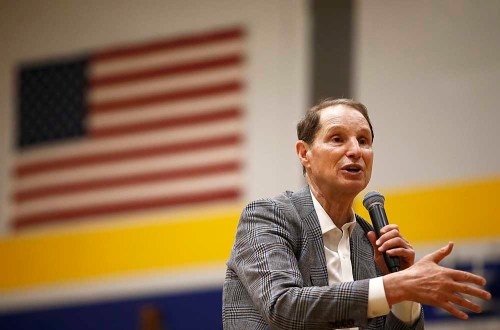Wyden looks to tumultuous end of 2021 Senate session
Published 2:00 pm Monday, September 7, 2020

- U.S. Sen. Ron Wyden, D-Ore., answers a question from the crowd during a town hall at Crook County Middle School.
BEND — Congress returns to Washington on Tuesday, Sept. 8, for likely the final floor sessions prior to the bitterly fought Nov. 3 general election.
Sen. Ron Wyden, D-Ore., laid out his view of the political landscape in an interview last week before returning to Washington, D.C. Action on a coronavirus relief package is essential, he said. But getting to a consensus may be too much to ask.
“I’m with Yogi Berra — I don’t do predictions, especially about the future,” Wyden said. “In our state, in Oregon, people want to see things done ‘The Oregon Way.’ Find ideas that make common sense.”
Both the Republican-controlled Senate and Democratic-controlled House have coronavirus relief on their agendas. But they have failed to reach a consensus on a how much should be spent, for how long, and who should receive the aid.
The clock is running down on the time to do something before the election. Lawmakers plan to go home for October to campaign. All 435 House seats are up for election, plus 35 Senate seats.
At the top of the ballot will be the the race for the White House, with President Donald Trump seeking a second four-year term, opposed by former Vice President Joe Biden, the Democratic Party nominee.
Wyden said what happens in the Senate is largely in the hand of Senate Majority Leader Mitch McConnell, R-Ky.
“I really hope that Mitch McConnell will take up a coronavirus package that the House approved,” Wyden said.
The House passed a $3.4 trillion relief bill in May, but McConnell has said he would not bring it up for a vote in the Senate.
President Trump and Republicans have said about $1.3 trillion is enough. House Democrats say they are willing to cut the bill to $2.2 trillion. For now, there is a stalemate.
“That leaves us with a failure on unemployment,” Wyden said.
House Speaker Nancy Pelosi, D-Calif., has said she will delay any floor votes until Sept. 15 to give the Senate time to reconsider the House-passed relief bill.
One major stumbling block appears to have been removed. The current federal fiscal year ends Sept. 30. But Vice President Mike Pence said last week that all sides have agreed to a short-term extension of government spending at current levels to allow lawmakers to concentrate on pandemic relief.
Republican leaders say the economy is showing signs of recovery and given the trends they see, there is too much waste in the House plan.
The U.S. Department of Labor reported last week that nonfarm payrolls in the U.S. had added 1.37 million jobs, with the unemployment rate falling to 8.4%.
“Great Jobs Numbers!,” President Trump tweeted on Sept. 5. “Wow, much better than expected! Broke the 10% level faster and deeper than thought possible.”
Senate Minority Leader Chuck Schumer, D-N.Y., responded, “8.4% unemployment is nothing to brag about.”
Democrats want a large chunk of the money to go to backfill depleted state budgets. Unlike the federal government, most states — including Oregon — require budgets to be balanced between revenue and spending.
Trump has opposed the aid, saying he wasn’t going to foot the bill for “mismanagement” by Democratic governors and mayors.
Wyden said lawmakers are hearing pleas for help from around their states. He believes the closer the debate on the relief package gets to the election, the less likely that McConnell or Trump can control all the votes in the GOP’s 53-47 majority in the Senate.
“The reality is there are six to eight Republicans who are on the bubble on how they will vote,” Wyden said. “If they heard from home what I think they are hearing, they have to be concerned about not doing enough.”
Wyden said he didn’t know of any state where residents and local governments aren’t stressed by the hobbled economy.
“Small businesses are hurting,” he said. “People can’t pay rent or buy groceries. That’s Democrats and Republicans.”
Wyden had been a chief proponent of the additional $600 in weekly federally financed unemployment aid in the initial coronavirus relief package last spring. He had worked with Treasury Secretary Steve Mnunchin to get Trump’s agreement to the plan despite opposition from some Senate Republicans.
The $600 benefit was allowed to lapse at the end of July with no replacement plan.
Wyden said the emergency atmosphere of the early months of the crisis paved the way for Republicans to accept the need for a big government role in relief. That attitude has largely evaporated, he said.
“I am in a tough political background,” he said. “I always tried to make these issues bipartisan. When unemployment tapers off, benefits should taper off.”
That time has not arrived yet, Wyden said.
“OK, but are we going to get out of setting arbitrary dates or are we going to tie unemployment benefits to the conditions on the ground?” he said.
While some Republicans still feel the pandemic is a once-in-a-lifetime crisis, Wyden said many are falling back on what he said are traditional Republican positions that are loathe to the federal government guaranteeing a minimum level of income.
“Mitch McConnell’s first proposal had no unemployment benefits — nothing,” Wyden said. “I said, ‘We are not going to let you stiff workers. They have been told by the government that because of this coronavirus, you need to go home, goodbye.”
If government mandates are keeping workers from their jobs because it is crucial to staving off a public health crisis, Wyden said it was up to government to make sure those workers could survive in the meantime.
The best solution, he said, is to revive and extend the $600 unemployment benefit.
“Millions of people are able to pay rent and buy groceries,” he said. “The $600 was every week. And it was spent locally.”
Appropriating the money is one step, Wyden said. But Oregon is responsible for what he called the state’s inability to get money to the unemployed.
“I am incredibly infuriated by what is going on with the Oregon Employment Department,” he said. “Workers are waiting and waiting for benefits. We knew there were going to be problems, but not this extensive and not this long.”
Wyden said that the outdated state computer system that handles unemployment checks could cause a new problem. The system is likely to delay a federal plan to pay workers immediately after they file for benefits, removing the traditional “waiting week.”
“Hundreds of thousands of Oregonians who were laid off should get those checks,” he said. “Oregon is one of a handful of states that haven’t yet paid the money.”
Wyden said he is concerned with keeping enough money in the pipeline to help those who continue to struggle financially.
President Trump’s executive order that might pay workers $300 per week is likely unconstitutional because the spending wasn’t approved by Congress, Wyden said. Regardless, he believes the amount is too small.
“Very skimpy,” Wyden said.
Wyden said gig workers, the self-employed and recently graduated college students are among those who have been overlooked or under-compensated by federal employment aid programs so far.
Besides coronavirus relief, Wyden said his other top priority was ensuring a fair and transparent vote for president and other offices in November.
Wyden criticized recent cuts and changes at the U.S. Postal Service as at the very least ill-timed. Americans need to have confidence in the mail system at a time when a highly infectious disease makes going to physical polling places difficult and possibly dangerous for some Americans.
Wyden pointed to Oregon’s “vote by mail” system as a bipartisan success that should be embraced by other states — at least during the pandemic.
“In Oregon we have had it for 20 years,” Wyden said. “I was the first senator elected with just vote by mail,” Wyden said. “Gordon Smith, a Republican, was the second. We have built a system and it works.”
President Trump has made claims — discounted by both Democratic and Republican state officials — that voting by mail could lead to election fraud. Wyden said the critical problem is getting elections off of systems that connect to the internet. He said more digital voting gives more entry points to hackers who want to disrupt the outcome of elections.
“It’s like putting your ballot box in Moscow,” Wyden said.
Wyden said the likelihood of delays in action on any legislation increases each week the election draws closer. With both Republicans and Democrats running largely on the issues of the economy and coronavirus, no one wants to be seen as compromising.
Wyden said President Trump and Republican leaders see approval of a large aid package as undermining their central campaign message that the economy is improving and the COVID-19 crisis is coming increasingly under control, with a vaccine coming soon. Democrats say neither is true.
“I don’t see how Donald Trump can explain his irresponsible conduct in respect to the coronavirus,” Wyden said. “Take his own words.”
Wyden said the best message for Democrats is to simply play Trump’s remarks during the crisis over and over again on television, radio and the internet.
“It is one thing for people to make a charge, and then Trump makes a counter-charge,” Wyden said. “I say just take his own words since the beginning of all this and let voters hear them.”
Wyden said inside the Senate, he wants to work with Republicans to come to a consensus on coronavirus legislation. That is government. But outside the Senate floor, he is fighting for Democratic victories in the election. That is politics. Both are part of the process.
Wyden says he is taking nothing for granted, but hopes for not only a Biden victory over Trump, but for Democrats to win enough seats to take control of the Senate. That would allow for a more rapid rollback of what he said is four years of Trump’s damage to public health, the economy and environment.
“Americans deserve something better,” Wyden said. “This did not have to be this way. We should lead the world in how to fight (COVID-19). We should lead the world in testing.”
The election may be too big a hurdle for policy to triumph over politics in the next few weeks, Wyden said. Whatever the outcome, he expects the House and Senate will come back again after the Nov. 3 election, but before the 117th Congress is sworn into office in January.
“There will likely be a lame duck session,” he said. “There is still a need for aid to schools, help for families, assistance for small businesses, and making sure there is testing where we need it.”
Wyden, 71, is up for re-election next in 2022.
Asked if he will run again, Wyden says it’s too early for a decision. But his tone seems anything but retiring.
“I believe there is a tremendous amount of work to do,” Wyden said. “I show up every day. We need strong action for health care. Everybody should have a chance to get ahead. Infrastructure — roads, bridges, broadband. We still have big chunks of the state that can’t use the latest communications. It is too early for an announcement about 2022 — but there is a tremendous amount to do.”









